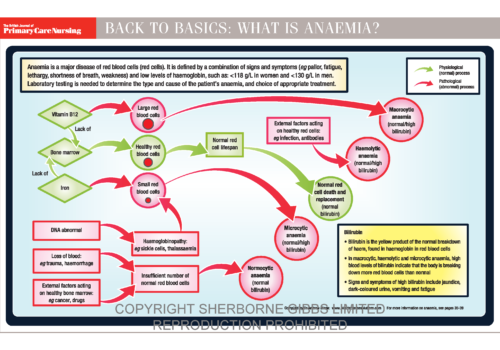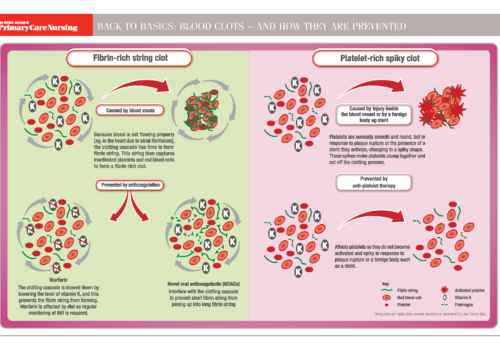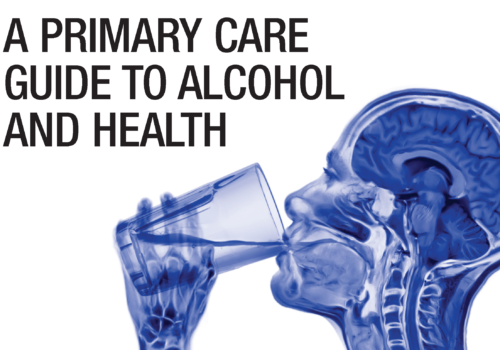Over 10 years ago, publication of Women’s Health Initiative (WHI) studies affected both public perceptions and our clinical prescribing of hormone replacement therapy (HRT). Front-page reports of higher risks of heart attacks, stroke and breast cancer led to around a million women in the UK stopping HRT, many without medical advice or clinical assessment. Since then, new evidence has emerged, much of which does not support the earlier alarming headlines.
Back to Basics: What is anaemia?
Ambulatory blood pressure monitoring: from guideline into practice
NICE now recommends that 24-hour ambulatory blood pressure monitoring (ABPM) rather than repeat clinic measurements should be the gold-standard test for diagnosing high blood pressure. This article considers the practicalities of using ABPM in the clinic, including advice to pass on to patients to ensure accurate readings.
Editorial
I looked through the topics in this issue of the journal and thought: wow, so many ways to kill ourselves younger than we really intended! I had also just heard a programme on the radio about the perils of alcohol consumption, especially in ladies ‘just like me’, and wondered if I should ever have a meal, a drink or sex again—it all sounded so risky.
Hepatitis B: A closer look at prevention and treatment
Liver disease is the fifth largest cause of mortality in England, after heart disease, cancer, stroke and respiratory disease. Of this ‘big five’, liver disease is the only major cause of death that is rising year on year, and it affects people at a younger age. It is also becoming clear that chronic hepatitis B infection is making an increasing contribution to the rising death toll from liver disease. Recently published NICE guidelines now give practice nurses and GPs a key role in the initial assessment and onward referral of patients to specialist services, and their subsequent care.
After brain attack: the new stroke guidelines
Most people now survive a first stroke, but many patients are left with significant disability. In this article, our very own BATman ‘goes through rehab’ to review recently published NICE guideline. This aims to ensure that all stroke survivors have access to effective, individualised rehabilitation, both in the hospital and during long-term follow-up in the community.
Androgens really matter to older men
Androgens such as testosterone, male sex hormones produced by the testicles, control the development and maintenance of masculine characteristics. Reduced testosterone levels—known as male hypogonadism—may cause both physical and psychological effects. These effects may be severe enough to compromise a man’s general wellbeing and his sex life in particular. But the decision to replace testosterone is not always straightforward, and patients need careful monitoring before and after starting treatment.
Back to Basics: Blood clots and how they are prevented
Managing venous thromboembolism in the 21st century
Venous thromboembolism (VTE) occurs when a blood clot forms in the wrong place, and it can cause serious illness or death. Treatment of VTE is currently very labour-intensive for nurses and awkward for patients. Novel treatments are more expensive and have their own risks. But this new approach is less reliant on nurse time and more straightforward for patients, and seems likely to become the norm during the next few years.
A primary care guide to alcohol and health
It has become increasingly clear that many people in this country are putting themselves at risk because they are continuing to drink above their recommended weekly units. Most of these people are not drunk drivers in police cells or antisocial drinkers arriving at A&E departments on Saturday night. They are people who come to see […]
Over the limit? A healthier approach to alcohol
Alcohol forms part of the diet for over 90% of adults in the UK and is unusual in being both a nutrient and a drug. For many of us, alcohol is a safe and pleasurable part of the diet. However, there is growing concern that many people who see themselves as social drinkers are consuming levels that may cause harm. Understanding how to assess safe levels of alcohol consumption and identify strategies for cutting down can help us to advise our patients how to moderate their intake.
Helping dependent drinkers to give up alcohol
It has been estimated that one in every five patients in the UK drinks to excess, so the average English general practice may have as many as 1,000 problem drinkers. This size of problem can only be dealt with effectively if all members of the primary healthcare team are involved in supporting problem drinkers and ensuring that dependent drinkers are referred to appropriate specialist services.

























